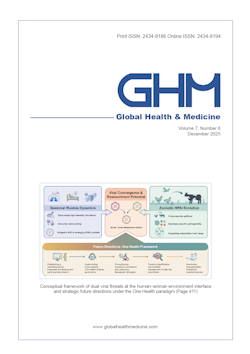Global Health & Medicine 2024;6(6):420-426.
Patient-specific brain fluorodeoxyglucose positron emission tomography can detect the first effects of combination antiretroviral therapy in patient with HIV infection
Chikanishi MM, Tanuma J, Ishii K, Sakata M, Arai N, Noguchi T, Komatsu K, Ito K, Mizoue T, Kubota K, Watadani T, Gatanaga H, Oka S
Patient-specific brain fluorodeoxyglucose-positron emission tomography (FDG PET) can detect areas with abnormal FDG uptake in patients with human immunodeficiency virus (HIV) before and after combination antiretroviral therapy (cART). There were few reports about the same patients before and shortly after cART in FDG PET. It is well known that HIV-RNA levels decrease and cognitive impairments in patients with HIV tend to improve on neurocognitive performance tests 6 months after starting cART. We conducted a quantitative imaging analysis (FDG PET and voxel-based morphometry (VBM)) of eight patients at pre- and 6 months post- cART with neurocognitive performance tests. In terms of participant-specific changes between pre- and post-cART imaging, some area showed that the size of area with abnormal FDG uptake shrunk and became a nearly physiological level at 6 months post-cART. No apparent changes in VBM were observed in this short period. FDG PET might detect the first effect of cART.
DOI: 10.35772/ghm.2024.01039







